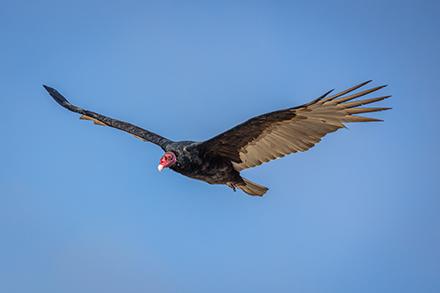Flying to the Rescue

California condor. (Photo by Getty Images, 1444136341)
Scientists with the Agricultural Research Service (ARS) recently joined other federal agencies to take emergency action to protect one of America’s endangered species, the California condor.
Weighing in at about 25 pounds with a wingspan of over 9 feet, the California condor is America’s largest land bird. The condor is also very rare, with only about 561 currently living – up from only 23 in 1982, thanks to captive breeding programs. Now, however, highly pathogenic avian influenza (HPAI) is threatening this magnificent bird yet again.
“The U.S. Fish and Wildlife Service is leading an effort to immunize the raptors, and ARS has been instrumental in the project,” said David Suarez, acting laboratory director at the ARS Southeast Poultry Research Laboratory in Athens, GA. “ARS developed a vaccine that was commercially produced by a partner company, and we tested it in both vultures and condors.”
The work supported an interagency agreement with USDA’s Animal and Plant Health Inspection Service under ARS’s HPAI project.
“In 2023, we lost 17 condors to an outbreak of HPAI,” Suarez said. “We considered our options and believed that we could vaccinate condors to protect them. Using a vaccine developed by ARS, we did safety trials in black vultures, a close cousin to the condors, before we vaccinated condors at captive breeding locations.”
HPAI is an extremely contagious disease that can spread from wild to captive birds and has for years devastated the American poultry industry. According to Suarez, the current outbreak has involved over 60 million chickens and turkeys in 47 states and wild birds in 49 of the 50 states. USDA has spent close to a billion dollars trying to control HPAI and consumers have paid billions in higher prices related to the decreased poultry and egg supply.
The HPAI virus is transmitted in the feces of infected animals, as well as through oral secretions and organs of animals. Condors are particularly at risk because they eat carrion, the decaying flesh of dead animals, which makes the vaccine a potential lifesaver.
“[The vaccine] produces a protective antibody to the influenza virus,” Suarez explained. “The antibody reduces the risk of infection and reduces/prevents clinical disease if an animal does become infected.”
Currently, captive California condors that are scheduled for release have received the vaccine. Licensed veterinarians have been vaccinating the birds in three states.
“[The vaccine] is highly likely to provide some protection in condors, [but] it remains to be seen how the program needs to be maintained long-term,” Suarez said. “[This is] a chance to save an endangered species with your research. Doesn’t get cooler than that.” – by Scott Elliott, ARS Office of Communications
Also in our series on exotic animal diseases:

